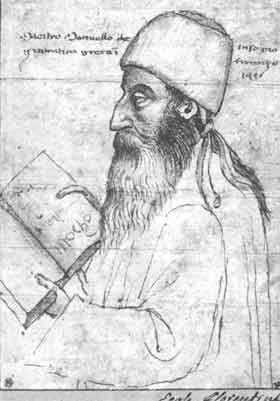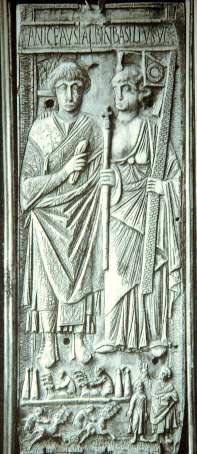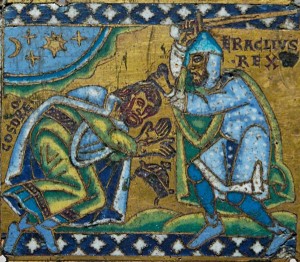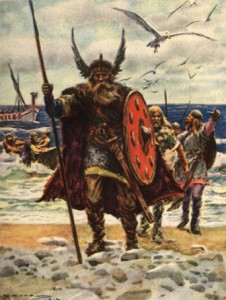 Listener Eric asked if there was any truth to the medieval rumor that the legendary Hrolfr Granger- a man so enormous that no horse could support his weight- was actually Rollo of Normandy.
Listener Eric asked if there was any truth to the medieval rumor that the legendary Hrolfr Granger- a man so enormous that no horse could support his weight- was actually Rollo of Normandy.
Believe it or not this was a question of such fierce debate in the early 20th century that it spilled into national newspapers and became the subject of several angry diatribes. 1911 was the 1,000th year anniversary of the founding of Normandy and there was much Scandinavian pride in this native son made good. The trouble was that no one was exactly sure where Rollo came from and both Denmark and Norway claimed him. Norway especially was proud of its distinct national character (they had just broken away from Sweden in 1905) and wasn’t about to let Denmark steal their thunder.
What made the argument particularly fierce is that there is so little reliable information about Rollo’s origins. The earliest source (Richer of Reims- circa 996) gives Rollo a Danish origin, but he makes no distinction between any Vikings, referring to all of them as Danes. Where exactly each roving band of raiders originated was not that important to those who had to fend them off. The Norse sagas on the other hand (circa 12th century) all claim that Rollo (whom they call Hrolfr Granger) was from Norway as does the French Chronicon de gestis Normannorum and the Welsh Historia Gruffud vab Kenan. The Normans themselves were split on the subject. Dudo of St. Quentin (1030) gave Rollo a Danish father while Geoffrey Malaterra (1090) gave him a Norwegian one.
The truth unfortunately is that we will probably never have conclusive proof either way. I tend to think that the Norse account of Hrolfr Granger contains a healthy dose of legend but that it can loosely be connected to Rollo. The medieval sources, when they bothered to distinguish between different groups of Vikings, usually came down on the side of a Norwegian ancestry. Hardly an airtight case, but most likely the best we can do.

Chrysoloras
Listener Gerardo asked if the Renaissance can really be attributed to Byzantium’s influence. I think it’s going too far to say that Byzantine émigrés caused the Renaissance, but they certainly shaped it. Western Europe was rediscovering its classical past and was fascinated especially by ancient Greece when Byzantine figures like Pletho, Chrysoloras and Cydones arrived. They acted as a catalyst to a movement already underway, tutoring some of the earliest figures of the Renaissance. The study of Greek- which had died out in medieval Europe- was re-introduced and the West was re-acquainted with the giants of Greek learning. The Renaissance would undoubtedly have occurred without these direct Byzantine influences, but it would have been much poorer for the absence.
 Listener Allison asked which emperor had the distinction of being the last Roman sovereign to set foot in the ancient capital city. It was the uninspiring John VIII who visited in 1423 to beg for help against the Ottoman Turks. His stay in the Eternal City was quite a contrast from the previous imperial visit. That had been in 663 when the emperor Constans II had visited for 12 days. Despite a stay of less than two weeks, Constans managed to annoy the entire population by stripping everything of value (including the bronze from the roof of the Pantheon) to fund his war against the Arabs. Rumor had it that his tax collectors were so severe that husbands were sold into slavery and wives were forced into prostitution to meet the sums demanded. Fortunately for John VIII, seven centuries tend to dim those kind of memories. He was given a warm welcome and Renaissance artists, taken by his exotic dress left several realistic portraits. Thanks to that Roman trip, he remains the one Byzantine emperor to be realistically painted- a notoriety he certainly didn’t deserve!
Listener Allison asked which emperor had the distinction of being the last Roman sovereign to set foot in the ancient capital city. It was the uninspiring John VIII who visited in 1423 to beg for help against the Ottoman Turks. His stay in the Eternal City was quite a contrast from the previous imperial visit. That had been in 663 when the emperor Constans II had visited for 12 days. Despite a stay of less than two weeks, Constans managed to annoy the entire population by stripping everything of value (including the bronze from the roof of the Pantheon) to fund his war against the Arabs. Rumor had it that his tax collectors were so severe that husbands were sold into slavery and wives were forced into prostitution to meet the sums demanded. Fortunately for John VIII, seven centuries tend to dim those kind of memories. He was given a warm welcome and Renaissance artists, taken by his exotic dress left several realistic portraits. Thanks to that Roman trip, he remains the one Byzantine emperor to be realistically painted- a notoriety he certainly didn’t deserve!
 Listener John asked when exactly the office of the Consul died out. The Consulship was the highest office in Republican Rome, dating back to the hazy days in the sixth century BC when the last Etruscan King was expelled from the city. The two elected Consuls held most of the powers of a king, and dates were calculated from the start of their terms. With the rise of the empire, however, it became a largely symbolic office, and was mostly awarded by emperors to themselves. Its prestige was further diminished when later rulers started conferring it on imperial children (Caligula didn’t help matters when he announced that he was nominating his horse) and by the time of Justinian in the sixth century it was allowed to lapse from its yearly appointment. The last politician to hold it was a man with the impressive name of Anicius Faustus Albinus Basilius in 541 (that’s a picture of him at the top). He had the misfortune to be in Rome when Totilla and the Goths stormed it, and was forced to flee with his Consular robe into obscurity. That wasn’t quite the end of the office, however. It continued to exist as part of the coronation ceremony for another century. The last recorded emperor to receive the dignity was Justinian II who combined the Consulate with the office of Emperor. From then on the title seems to have been forgotten until the tenth century when the emperor Leo the Wise officially abolished it.
Listener John asked when exactly the office of the Consul died out. The Consulship was the highest office in Republican Rome, dating back to the hazy days in the sixth century BC when the last Etruscan King was expelled from the city. The two elected Consuls held most of the powers of a king, and dates were calculated from the start of their terms. With the rise of the empire, however, it became a largely symbolic office, and was mostly awarded by emperors to themselves. Its prestige was further diminished when later rulers started conferring it on imperial children (Caligula didn’t help matters when he announced that he was nominating his horse) and by the time of Justinian in the sixth century it was allowed to lapse from its yearly appointment. The last politician to hold it was a man with the impressive name of Anicius Faustus Albinus Basilius in 541 (that’s a picture of him at the top). He had the misfortune to be in Rome when Totilla and the Goths stormed it, and was forced to flee with his Consular robe into obscurity. That wasn’t quite the end of the office, however. It continued to exist as part of the coronation ceremony for another century. The last recorded emperor to receive the dignity was Justinian II who combined the Consulate with the office of Emperor. From then on the title seems to have been forgotten until the tenth century when the emperor Leo the Wise officially abolished it.
 Reader Kevin asked this question and it’s one that I get a lot. The Islamic contribution to scientific learning is an important one and is widely taught in schools. They played a vital role both in the advancement of science and in its transmission to the West, specifically through Spain. What is frequently overlooked, however, is the Byzantine underpinnings of that achievement. Unlike the West where the pagan aspects of the classical past made it taboo, the East viewed it as inseparable from Christian society. The fourth century Church father Basil of Caesarea summed up the Byzantine position neatly in a pamphlet he wrote called ‘To Young Men, On How They Might Derive Profit from Pagan Literature’. The classical world, in other words, was a treasure trove to be mined- though with extreme caution. This is not to say that the Byzantines continued the Greek spirit of inquiry full bore, merely that they preserved the Greek legacy more or less intact. After the initial shock of Islamic conquest, when it became apparent that the empire wasn’t going to be swept away, relations with the rising Caliphate became more stable, allowing a cultural exchange. The Arabic world absorbed Greek learning and improved on it, pushing the frontiers of medicine and science during the brilliant High Caliphate. Those advances in learning fully belong to Arab genius, but they couldn’t have been accomplished without the preserved texts or tutors and scholars to translate them. These were all ultimately provided by Byzantium.
Reader Kevin asked this question and it’s one that I get a lot. The Islamic contribution to scientific learning is an important one and is widely taught in schools. They played a vital role both in the advancement of science and in its transmission to the West, specifically through Spain. What is frequently overlooked, however, is the Byzantine underpinnings of that achievement. Unlike the West where the pagan aspects of the classical past made it taboo, the East viewed it as inseparable from Christian society. The fourth century Church father Basil of Caesarea summed up the Byzantine position neatly in a pamphlet he wrote called ‘To Young Men, On How They Might Derive Profit from Pagan Literature’. The classical world, in other words, was a treasure trove to be mined- though with extreme caution. This is not to say that the Byzantines continued the Greek spirit of inquiry full bore, merely that they preserved the Greek legacy more or less intact. After the initial shock of Islamic conquest, when it became apparent that the empire wasn’t going to be swept away, relations with the rising Caliphate became more stable, allowing a cultural exchange. The Arabic world absorbed Greek learning and improved on it, pushing the frontiers of medicine and science during the brilliant High Caliphate. Those advances in learning fully belong to Arab genius, but they couldn’t have been accomplished without the preserved texts or tutors and scholars to translate them. These were all ultimately provided by Byzantium.
The empire played a similar catalyst role in the Renaissance. Byzantine émigrés traveled to the West and re-introduced the study of Greek classics, tutoring luminaries like Petrarch and Boccaccio in the process. Cosimo Medici was even so impressed by a lecture on Plato from a Byzantine scholar named Pletho, that he restarted the Academy in Florence. Obviously both the Renaissance and the Arab Enlightenment pushed the frontiers of knowledge in ways that were independent of Byzantium, but neither would have been possible without Byzantine pens.
 Listener Bruce from Ohio asked about the background of the Normans. Can they really be considered Vikings? The answer- as is so often the case with history- is yes and no. The Normans were indeed descended from Scandinavian stock and the term ‘Norman’ comes from ‘northmen’ which was the French term for the Vikings. Rollo the first “Duke” led a collection of Norwegian and Danish raiders who forced the Frankish king Charles the Simple to grant them land. These Vikings, however, were always a minority in Normandy, surrounded and vastly outnumbered by the French population. Rollo, who knew he had to adapt to survive, set the tone by taking a Frankish wife, adopting the French language and religion, and encouraging his men to do likewise. Within a generation Norse names died out, and the Dukes were busy trying to prove that they were respectable members of the Frankish power structure. They maintained close ties with their Scandinavian cousins- even agreeing to sell Viking plunder in their markets- but made it a point to distinguish themselves from the ‘sea wolves’.
Listener Bruce from Ohio asked about the background of the Normans. Can they really be considered Vikings? The answer- as is so often the case with history- is yes and no. The Normans were indeed descended from Scandinavian stock and the term ‘Norman’ comes from ‘northmen’ which was the French term for the Vikings. Rollo the first “Duke” led a collection of Norwegian and Danish raiders who forced the Frankish king Charles the Simple to grant them land. These Vikings, however, were always a minority in Normandy, surrounded and vastly outnumbered by the French population. Rollo, who knew he had to adapt to survive, set the tone by taking a Frankish wife, adopting the French language and religion, and encouraging his men to do likewise. Within a generation Norse names died out, and the Dukes were busy trying to prove that they were respectable members of the Frankish power structure. They maintained close ties with their Scandinavian cousins- even agreeing to sell Viking plunder in their markets- but made it a point to distinguish themselves from the ‘sea wolves’.
So what exactly were they? As frustrating as it is we have to fall back on how they saw themselves. Their court historians never tired of pointing it out. They were not Vikings or French but something far better. They were Normans.
 Listener Eric asked if there was any truth to the medieval rumor that the legendary Hrolfr Granger- a man so enormous that no horse could support his weight- was actually Rollo of Normandy.
Listener Eric asked if there was any truth to the medieval rumor that the legendary Hrolfr Granger- a man so enormous that no horse could support his weight- was actually Rollo of Normandy.



